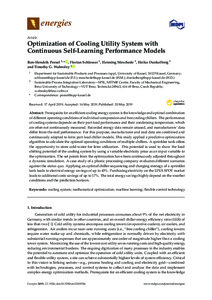Optimization of Cooling Utility System with Continuous Self-Learning Performance Models
| dc.date.accessioned | 2019-09-10T15:03:23Z | |
| dc.date.available | 2019-09-10T15:03:23Z | |
| dc.date.issued | 2019-05-20 | |
| dc.identifier | doi:10.17170/kobra-20190909661 | |
| dc.identifier.uri | http://hdl.handle.net/123456789/11312 | |
| dc.description.sponsorship | Gefördert durch den Publikationsfonds der Universität Kassel | ger |
| dc.language.iso | eng | eng |
| dc.rights | Urheberrechtlich geschützt | |
| dc.rights.uri | https://rightsstatements.org/page/InC/1.0/ | |
| dc.subject | cooling system | eng |
| dc.subject | mathematical optimization | eng |
| dc.subject | machine lerning | eng |
| dc.subject | flexible control technology | eng |
| dc.subject.ddc | 620 | |
| dc.title | Optimization of Cooling Utility System with Continuous Self-Learning Performance Models | eng |
| dc.type | Aufsatz | |
| dcterms.abstract | Prerequisite for an efficient cooling energy system is the knowledge and optimal combination of different operating conditions of individual compression and free cooling chillers. The performance of cooling systems depends on their part-load performance and their condensing temperature, which are often not continuously measured. Recorded energy data remain unused, and manufacturers’ data differ from the real performance. For this purpose, manufacturer and real data are combined and continuously adapted to form part-load chiller models. This study applied a predictive optimization algorithm to calculate the optimal operating conditions of multiple chillers. A sprinkler tank offers the opportunity to store cold-water for later utilization. This potential is used to show the load shifting potential of the cooling system by using a variable electricity price as an input variable to the optimization. The set points from the optimization have been continuously adjusted throughout a dynamic simulation. A case study of a plastic processing company evaluates different scenarios against the status quo. Applying an optimal chiller sequencing and charging strategy of a sprinkler tank leads to electrical energy savings of up to 43%. Purchasing electricity on the EPEX SPOT market leads to additional costs savings of up to 17%. The total energy savings highly depend on the weather conditions and the prediction horizon. | eng |
| dcterms.accessRights | open access | |
| dcterms.creator | Peesel, Ron-Hendrik | |
| dcterms.creator | Schlosser, Florian | |
| dcterms.creator | Meschede, Henning | |
| dcterms.creator | Dunkelberg, Heiko | |
| dcterms.creator | Walmsley, Timothy Gordon | |
| dc.relation.doi | doi:10.3390/en12101926 | |
| dc.type.version | publishedVersion | |
| dcterms.source.identifier | ISSN 1996-1073 | |
| dcterms.source.issue | Issue 10 | |
| dcterms.source.journal | Energies | eng |
| dcterms.source.pageinfo | 1926 | |
| dcterms.source.volume | Volume 12 |
Dateien zu dieser Ressource
Das Dokument erscheint in:
-
Artikel [1186]

